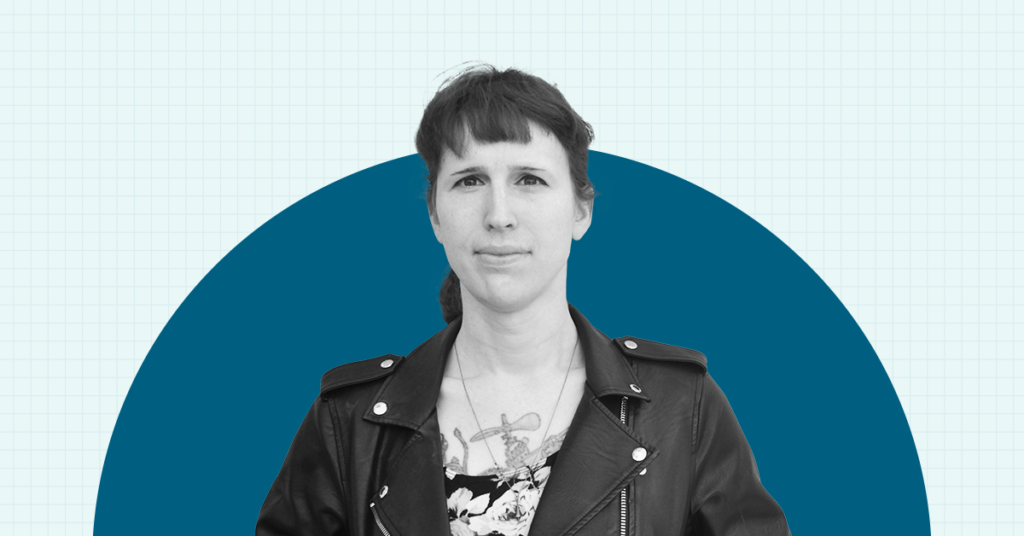Get to Know Noodle Senior Director of Integrated Learning & Development, Katharine Hill
We all rely on each other to get the information we need, determine our shared goals, and evaluate strategies needed to get to our next steps.
Katharine Hill is Noodle’s Senior Director of Integrated Learning & Development. Originally from Oregon and raised on the West Coast and also in northern England, Katharine shares their family moved around quite a bit. Katharine received their History degree from Brown University and has had different roles within education ranging from being a teacher, administrator and learning specialist to now focusing on adult learning and development. They share that while working in education they’ve focused on increasing the number of BIPOC and women in STEM fields. Now here at Noodle, Katharine supports the company with our internal learning and development strategies and opportunities. Check out more of their story below!
What elements or traits does a great leader exhibit?
Humility and empathy. Great leaders develop trust by making decisions based on factors that benefit others – either more than themselves, or at least as much as themselves.
When you think of great leadership, who comes to mind? Why?
I think of someone like Harvey Milk, who was the first openly gay elected official in California. Through his representation and visibility as one of the few openly gay politicians at the time, he inspired people to embrace their identities and push for change. Milk’s exceptional grassroots organizing, political accomplishments, and commitment to intersectional advocacy laid the foundation for progress and continue to inspire people fighting for equality now.
How has your personal leadership style evolved?
I am very aware of how interconnected we all are, especially in our business at Noodle. We are always evolving to better serve our institutional partners. We all rely on each other to get the information we need, determine our shared goals, and evaluate strategies needed to get to our next steps. I’m more aware now than ever of how important our relationships are in underpinning the high level of collaboration that our business requires. I also believe we need to support one another in creating room to develop these professional relationships even further.
What is it about your background or career experiences that successfully positioned you for your role at Noodle? Describe that role.
My role at Noodle is to direct our internal integrated learning and development strategy and programs. Serving previously at Noodle as an Academic Director for our programs at UMich and Yale really helped me understand aspects of our core business, and in my current role, I’m able to join that awareness with my background in adult learning and development.
How do you support the success of your team?
I focus on trying to understand the end goal by asking questions like “What will this look like when it’s done?” and “How do we want employees to feel and what do we want them to be able to do when they’ve completed this training?” From there we can work backwards to understand the timelines, requirements, and precursor information we need in order to design effective learning experiences that meet our core business needs.
Describe how your career has been enhanced by exposure to diverse people, places or experiences.
I grew up in two countries with different social settings in each. I’ve lived in very rural and urban areas as a child and now I live in Brooklyn, New York, which is a super-diverse city of four million people within an equally diverse larger urban area. As a teenager, I worked in environments where I was often in the minority when it came to race and language – but I went to school in a predominantly white area. I’ve been able to see— very early on— the effects of the unearned privilege that comes with being a white English speaker in a lot of parts of the world. I also felt a lot of specific gendered expectations for my behavior because others identified me as female and I didn’t have an effective way at the time to express that I identify as non-binary. These types of exposure have given me an appreciation for treating people as individuals, while working to acknowledge the ways that each of our identities shapes our experiences. If we want to treat people as individuals, we have to learn what their specific experiences have been and what their needs are.
What are some of the most effective tools in your leadership arsenal?
Going through my calendar at the start of the week and previewing deliverables I need to have ready before certain meetings or ahead of upcoming deadlines helps me stay focused on my bigger priorities. Developing positive relationships with colleagues across the company, whether they are in the early stages of their careers or are already very accomplished, feels very effective to me. I want to understand the experiences of colleagues at all levels. I’m not very hierarchical in my approach, but it’s common to see hierarchies in organizations. I like to subvert that as much as possible because I believe hierarchies can create unhelpful barriers. But they’re real, so we have to acknowledge them!
Please tell us something about yourself that people would be surprised to learn.
I’ve worked since I was eleven years old! My first summer job was picking fruit in Oregon. It was the late 1980s, and we were paid 15 cents per pound for blueberries and two dollars per flat for strawberries. A flat is 12 pints – nine pounds of strawberries. You have to kneel on the ground to pick strawberries, but you can stand or bend over to pick blueberries. Personally, I have a strong preference for standing up. If I ever work in agriculture again, I’m focusing on picking the blueberries!



